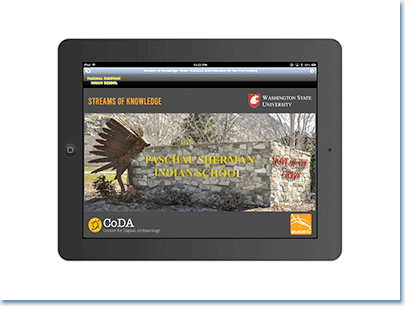Earlier this summer, we profiled a few recipients of the National Endowment for the Humanities’ (NEH) Digital Humanities Start-Up Grants (http://j.mp/1574SEb) to see what kinds of projects were emerging from the world of DH with particular applications for historians.
This week we wanted to catch up with the new cohort of Digital Humanities Implementation Grantees, recently announced by the NEH Office of Digital Humanities (ODH). The implementation grants are for mature projects that have grown past the start-up phase, and typically receive funding for multi-year development. Unlike DH Start-Up Grants, which are awarded to support planning and prototyping, the implementation grants are for projects that have developed beyond the start-up phase and reflect long-term investments by departments and staff.
The six grant awards for 2013 represent a range of developments, many of them platforms that will enhance and enable projects by scholars across the humanities. It is notable that many of these projects have built in opportunities for users working on topics outside the subject area’s geographic or temporal range, primarily through open source development and the emphasis on sharing data. For example, the WorldMap project was originally developed at Harvard as the AfricaMap, a resource for Africanist scholars. Project director Suzanne Blier notes that WorldMap has expanded into a platform that allows “students and scholars alike to explore geo-spatial and temporal topics of their choosing.”
Dan Edelstein, a project director for Mapping the Republic of Letters (MRL), which received a grant to develop visualization and analytical tools, emphasized the different audiences that the project team identified. In addition to early modern scholars, who would be MRL’s expected users, he pointed out that, “scholars with their own data about intellectual networks (of any period) can visualize it using our open-source software; and the general public, as well as teachers, can use our maps and networks graphs as visual aids for explaining how the Republic of Letters functioned and evolved over time.”
Brett Bobley, director of the NEH ODH, concurred in an e-mail, noting that the projects highlighted “research methods that can be used not only by historians but by scholars and educators across numerous disciplines.”
The six projects are listed in brief below, but for more about all the DH grant winners, including interviews with project directors and features on winning projects, and for information about applying, visit the ODH page .
Extending WorldMap to Make It Easier for Humanists and Others to Find, Use, and Publish Geospatial Information. Continuing development of the WorldMap platform, a system that allows scholars, teachers, and students to explore, visualize, edit, and publish geospatial information.
Peter Bol, Project Director
Suzanne Blier, Project Director
Harvard University, Cambridge, MA
Scaling Digital Gaming to Humanities Pedagogy and Praxis. Development of a platform that would allow educators across humanities disciplines to create web-based, multiplayer historical role-playing games. The platform would also include tools to facilitate peer review of game materials.
Christian Spielvogel, Project Director
Hope College, Holland, MI
Annotation Studio: Multimedia Annotation for Students. Further development and wide-scale implementation of Annotation Studio, a platform to enhance student learning through annotation of digital texts, images, and video resources.
James Paradis, Project Director
Kurt Fendt, Project Director
Massachusetts Institute of Technology, Cambridge, MA
Scribe: Turning Text into Structured Information through the Power of the Crowd. Further development of Scribe, an open-source, extensible software platform for crowdsourced transcription of cultural heritage collections, including tools for transcription management, quality control, and data sharing.
Benjamin Vershbow, Project Director
Chris Lintott and Arfon Smith (Zooniverse/Adler Planetarium), Project Co-Directors
New York Public Library, New York, NY
Networks in History: Data-Driven Tools for Analyzing Relationships across Time. To support a project to develop a general-purpose suite of visualization and analytical tools based on the prototypes created for the Mapping the Republic of Letters project, which examines the scholarly communities and networks of knowledge during the period 1500–1800.
Dan Edelstein, Project Director
Paula Findlen, Project Director
Nicole Coleman, Project Director
Stanford University, Stanford, CA
Mukurtu Mobile: Empowering Knowledge Circulation across Cultures. The development of Mukurtu Mobile, an open-source mobile platform for collecting and exhibiting indigenous digital cultural heritage.
Kimberly Christen, Project Director
Washington State University, Pullman, WA
This post first appeared on AHA Today.
Tags: AHA Today Digital History
Comment
Please read our commenting and letters policy before submitting.







